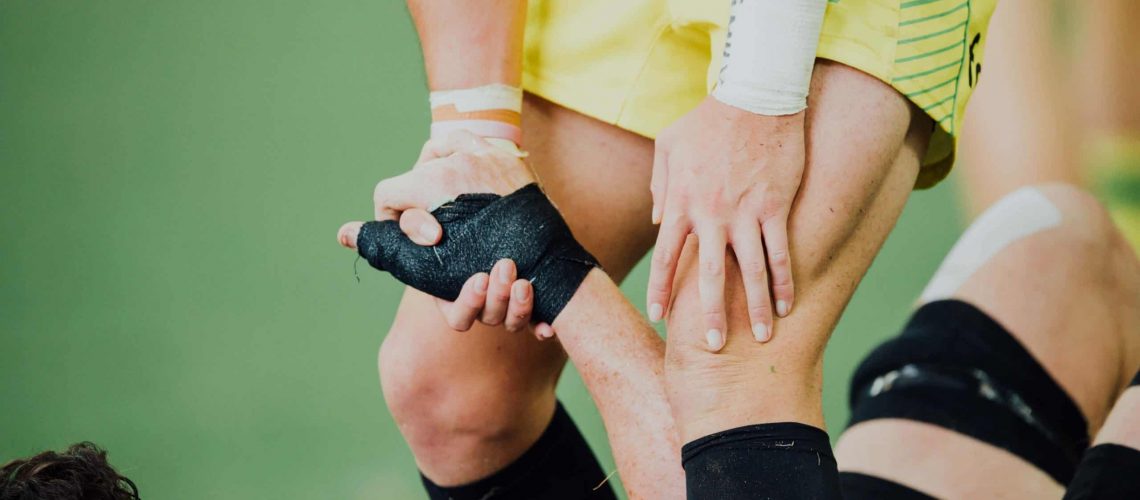Many of us play sports at some point during our life, and it is beneficial for our mental, physical and emotional health. Playing sports comes with some level of risk and knowing how to prevent injuries and minimize risk is essential.
The more often you play sports, the greater the chance of you having injury such as meniscus tears, ACL, MCL, knee injury, elbow or shoulder injury. Whatever sports you are playing, there are a few simple prevention tips that can help athletes on the field instead of on the sidelines.
Contents
10 Tips For Sports Injury Prevention
These tips are easy to implement and can make a significant impact when it comes to reducing the possibility of injury from physical activity and playing sports.
Tip #1. Get A Physical
A preseason physical can help uncover issues ahead of time and determine if you are fit to play. A sports physical helps to assess athletes and can often detect vulnerabilities that we may miss before heading out to the court or the field.
Tip #2. Ensure You Have The Proper Protective Equipment
While this one should be obvious, sometimes it is neglected. It is critical to have the correct protective equipment that fits properly and is designed specifically for the sport you are playing. Talking to your coach will ensure that you choose equipment that meets the necessary requirements and that it fits you the way it should.
Tip #3. Proper Rest
Make sure you get enough rest for your mind and body. Insufficient sleep can impact your mental abilities and lead to making a mistake causing you to get injured due to slow reflexes, unclear thinking, inability to focus, or poor choices. Proper rest is essential for athletes of all ages.
Tip #4. Drink Plenty Of Water
Hydration is critical and this includes before game day. Drinking enough water will help you avoid muscle cramps and dehydration. It will also reduce the possibility of feeling lightheaded, fatigued, nauseous, confusion, or fainting and vomiting due to exertion.
Tip #5. Stretch And Maintain Flexibility
It is crucial to keep your body, muscles, and joints properly stretched and flexible. Regardless of the sport, stretching increases your flexibility, loosens your muscles and helps prepare your body for playing. Static stretches like toe touching and dynamic stretches like jumping jacks will help to warm up your muscles. Cool down and stretch afterward to help your body’s recovery process.
Tip #6. Eat Healthy And Balanced Meals
Eating well-balanced meals regularly full of vegetables, fruits, and lean proteins is essential in maintaining a healthy body. Also make sure younger athletes are following safe eating habits in sports like wrestling where an athlete’s weight is often focused on due to the emphasized importance of weight requirements.
Tip #7. Emphasizing The Importance Of Proper Technique And Guidelines
Following your coach’s guidance will help reduce injuries. There is a wrong way and a correct way to play every sport. For football, learn the proper way to tackle to avoid concussions. Baseball, learning the appropriate way to throw and how many throws to make in a day to prevent shoulder injuries.
Tip #8. Get Help For Injuries Right Away
Often when someone gets hurt, they may just want to blow it foo. If you notice a change in technique due to an injury, a consistent limp, or need to the injured area often, seek the help of an orthopedic doctor to help prevent further damage. Getting help early on can prevent severe injuries from becoming worse. “Walking it off” is not always the best choice. If you have injured yourself, take a moment to assess it properly before going back out to play.
Tip #9. Avoid Overuse
Make sure you give the muscles a chance to rest and recover. An overuse injury occurs from repetitive trauma and typically comes from training or technique errors. Common injuries seen from overuse are tendonitis or stress fractures, and you can reduce your risk by pacing yourself, using proper gear, and cross-training.
Tip #10. Cross-Train In A Variety Of Sports
Change up your routine regularly to ensure that you are using different muscles. This ensures that athletes do not overuse the same muscles and joints by continuously playing the same sport. If you find yourself with a sports-related injury, work with a specialized orthopedic doctor to help you recover to your best capability and prevent further damage. Cross-training will also help to benefit your body’s overall strength, flexibility, and resiliency.
At Thunder Basin Orthopaedics, We Specialize In Orthopaedic Injuries
Our trained experts at Thunder Basin Orthopaedics and Sports Medicine are well-experienced and offer the best possible treatment. We will work with you to develop a personalized treatment plan to get you back in the game as soon as possible. Contact us today to schedule an appointment at one of our two locations in Gillette or Douglas, Wyoming.


